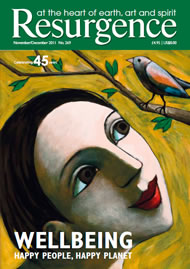Our current relationship with money is not compatible with a vision of sustainable development and human flourishing. It also accounts for the economic crisis that came to a head in 2008, the effects of which are still being experienced. This relationship is characterised by our overdependence on ‘financial experts’, our lack of education about money, and the taboo on speaking meaningfully about it.
The following matrix sets out, on the left, some of the values that currently dominate our society, and, on the right, their opposites, which are undervalued or ignored, at least in the public arena. There are two ways of using this matrix to put money in its proper place. The first is to acknowledge that the qualities on the right are an important part of being human and to discern on which side of the matrix to operate in a given situation. The second is to know how and when to transcend this matrix.
Individual - Interconnected/relationship
Competitive - Collaborative
Expert & expertise - Lay knowledge/interdisciplinarity
Authority - Dependence/powerlessness
Certainty - Uncertainty
Structure - Disorder
Money as commodity - Money as meaning
Mind - Body
Reason - Emotions
Conscious/visible/five senses - Unconscious/invisible/beyond five senses
Judgement & exclusion - Openness & inclusion
Tangible & physical - Intangible
The qualities on each side interact with those above and below them to create a coherent logic. “Modern industrialism”, wrote E.F. Schumacher in Good Work, “has produced its own coherent system of values, criteria, measurements, etc.; it all hangs together.”
To give an example of how we can undervalue the right-hand side, consider how as a society we value and like uniformity and order. We feel uncomfortable with disorder and conflict, so we shy away from it, and yet a better appreciation of the creative and transformative capacities of conflict and conflict-management skills would enable us to make huge changes in our lives.
Furthermore, we equate this coherence with common sense, and as common sense holds a good deal of authority, the preferred, left-hand set of values is taken to be inevitable, becomes invisible as a result and is consequently not challenged. The status quo remains undisturbed. So today the values on the left are worshipped: the heroic narratives of entrepreneurial success, the celebrity status accorded the wealthy and famous, and our self-definition by reference to external criteria such as our wealth. We all participate in this system, whether through ignorance, lack of ability to change anything or a sheer disregard for human flourishing. Before we can do anything differently we have to accept that change is possible and that we can be an agent of change. This of course is not easy, because the dominant value system is kept in place by very powerful forces we must not underestimate, not least of which is our dislike of disharmony. The media and advertising industry take full advantage of this and tell us what we want to hear, which confirms what we believe; this strategy is particularly effective when those beliefs are invisible and silent for the reason mentioned above.
Self-awareness, therefore, is difficult. Isn’t it always so much easier to see where others are going wrong? Our own limiting beliefs and habits are so much a part of us that we don’t even know they are there. You’ll note the emerging theme of silence and invisibility. This is where our relationship with money and what it means to us can play a vital role. Once we realise that money says as much about our personal worldview – whether we are spending, earning, saving, investing or giving – as it is a commodity, we have access to personal information that is otherwise hidden from us.
Take as a starting point the individual vs relationship dichotomy on the top line of the matrix– money divides far more often than it unites, because we don’t like talking about it. It is a taboo. Consider the number of families that face conflict at times of inheritance. Why do individuals write wills without discussing the impact of the estate plan with their inheritors while they are alive so as to avoid the additional burden of dealing with money at a time of great distress and bereavement? The system even hides this silence, because money is talked about everywhere: just look at any issue of a newspaper. There is much to be learned from this paradox. Even the professional ethics of lawyers demand client confidentiality, so family discussion is not encouraged: individual rights are indiscriminately preferred over family wellbeing. This was my professional background for over 20 years, so I am very aware of the destruction caused by the lack of appropriate training, and the indiscriminate and blunt application of objective rules in this very subjective area. Talking meaningfully and personally about money when appropriate is transformative.
The next issue that arises is to discern when to draw on one side or the other of the table. Comparison and designation of each side of this matrix as good or bad is not helpful: it keeps us trapped in judgement, blame, powerlessness and dependence.
Finally, there will be occasions to transcend the matrix and dissolve the barriers that reinforce the polarisation of each side. Fields such as neuroscience and developmental psychology, the contribution of personal reflection and dialogue to the production of knowledge, the existence of many types of intelligence, and the transcendence by philosophy of opposing states such as emotion and reason are also breaking down the divisions. This will lead to us being able to supplement our previously blind faith in financial experts and economists (and other experts, for that matter) with having greater respect and taking more responsibility for what matters to us. For example, there are programmes of financial inclusion and financial literacy that will make financial information more accessible and demand that it be understandable and comprehensive.
The financial crisis we are living through was caused by decisions that took no account of what matters in life – an effect of the increasing specialisation and generation of knowledge without ethics – and were wilfully blind to the effects of unchecked power. Those who seek power with desperation and without limit are those who are the least responsible.
Greater understanding brings with it an increased capacity for engagement. In Small is Beautiful, Schumacher wrote: “When a thing is intelligible you have a sense of participation: when a thing is unintelligible you have a sense of estrangement.”
Developing our wisdom, intuition and compassion by drawing on all of our intelligences will enable us to transcend this matrix. Trusting that we have these capacities will give us the confidence to ask hitherto unvoiced questions and to begin conversations that matter.
This article is based on a presentation given on behalf of the Schumacher Institute at the Initiatives for Change Leadership for Sustainability conference in Caux, Switzerland in August 2010. Nicola Jones also gave a presentation on this subject at the SPES Europe conference, Antwerp in September 2011.







